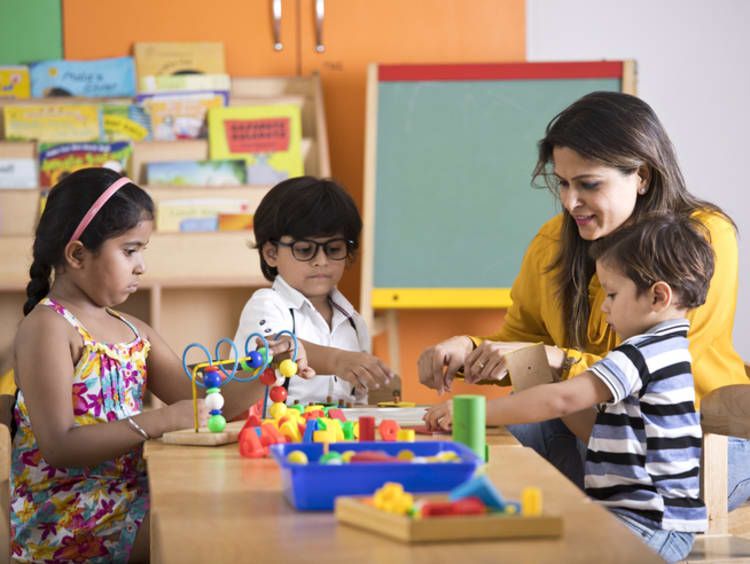
Early Childhood Care & Education (ECCE): Building Strong Foundations for the Future
The early childhood stage of a child is considered to be the most critical for growth and development. Between birth and approximately six years of age, children undergo enormous physical, emotional, social, and intellectual transformations. It is the time when their brain function is at its highest, absorbing knowledge from the external world like a sponge. Early Childhood Care and Education (ECCE) seeks to have these formative years spent in an appropriate mixture of learning, play, and care.
ECCE is not just about preparing children for school; it is about laying the foundation for a lifetime of learning, emotional health, and social adaptation. Governments across the globe, including India, are increasingly recognizing the importance of ECCE as a central element of a quality education system.
What is ECCE?
ECCE is a structured program that integrates health, nutrition, security, play, and early education for children between 0 and 6 years. The overall objective is to ensure all-round development—physical, emotional, social, and intellectual.
In contrast to conventional schooling, ECCE lays greater emphasis on learning through play, discovery, and interaction instead of strict academics. The model aids in the development of curiosity, confidence, and communications skills, which become the foundation of ongoing education.
Importance of ECCE
1.Brain Development
Almost 85% of brain development takes place by the age of six. ECCE makes children listen to tales, music, and games that enhance the brain’s cognitive abilities.
2. Social & Emotional Growth
Early childhood is when young ones learn how to communicate, share, cooperate, and form social relations. These help reduce future conduct issues and improve flexibility.
3. Basis for Formal Education
ECCE lays the foundation for early number, alphabet, shape, and color learning through fun. This simplifies initial transition to basic school, reducing school dropout.
4. Health & Nutrition
Good nutrition and hygiene are the core of ECCE. A healthy child can learn, play, and live with others in a harmonious manner.
5. Inclusivity & Equality
ECCE offers all children equal opportunities to learn, grow, and thrive, thereby preventing social and educational disparities.
Key Components of ECCE
Play-Based Learning – Play-based activities such as puzzle pieces, building blocks, role playing, and paintings constitute the cornerstone.
Storytelling & Language Development – Encourages listening, vocabulary, and understanding.
Physical Development – Physical skills are worked on through dance, outdoor games, and exercises.
Creative Expression – Music, drawing, and drama allow children to express themselves freely.
Life Skills Training – Self-eating, cleanup, and helping others promote responsibility and independence.
ECCE in India
The Government of India has emphasized ECCE through actions like the National Education Policy (NEP) 2020, giving significance to strong pre-school education. The policy is aimed at universal quality ECCE for children in the age group of 3–6 by the year 2030.
Programs like Anganwadi centres, preschool, and training for skills in ECCE teachers are being upgraded for improving accessibility of early education, especially in rural and disadvantaged regions.
Career Opportunities in ECC
ECCE has become a profitable career choice as the demand for trained professionals grows. Teachers, child caregivers, and childcare professionals are in demand in large numbers at:
Preschools & Nursery Schools
Daycare Centers
NGOs & Community Centers
International Schools
ECCE professionals not only parent children but also work with parents to create caring environments for holistic development.
Benefits to Parents and Society
Parents are reassured when they have the knowledge that their children are secure, healthy, and learning optimally.
Society has the advantage of well-prepared, mentally healthy, and socially aware citizens of the future.
The economy prospers as ECCE avoids school dropouts and contributes qualified, educated workers to the labor force.
Challenges in ECC
While important, ECCE has some issues:
Lack of trained teachers in rural settings
Limited accessibility to quality preschool centers
Poor financial resources for the needy families
Need for frequent checking and new curriculum
These are issues that require combined effort from the governments, NGOs, and private sectors.
Conclusion:-
Early Childhood Care and Education (ECCE) is not just a bridge to school. It is about developing the child’s wonder, imagination, and self-assurance in their most fragile years. Investing in ECCE is investing in healthier, smarter, and better-prepared generations.
Categories: Uncategorized